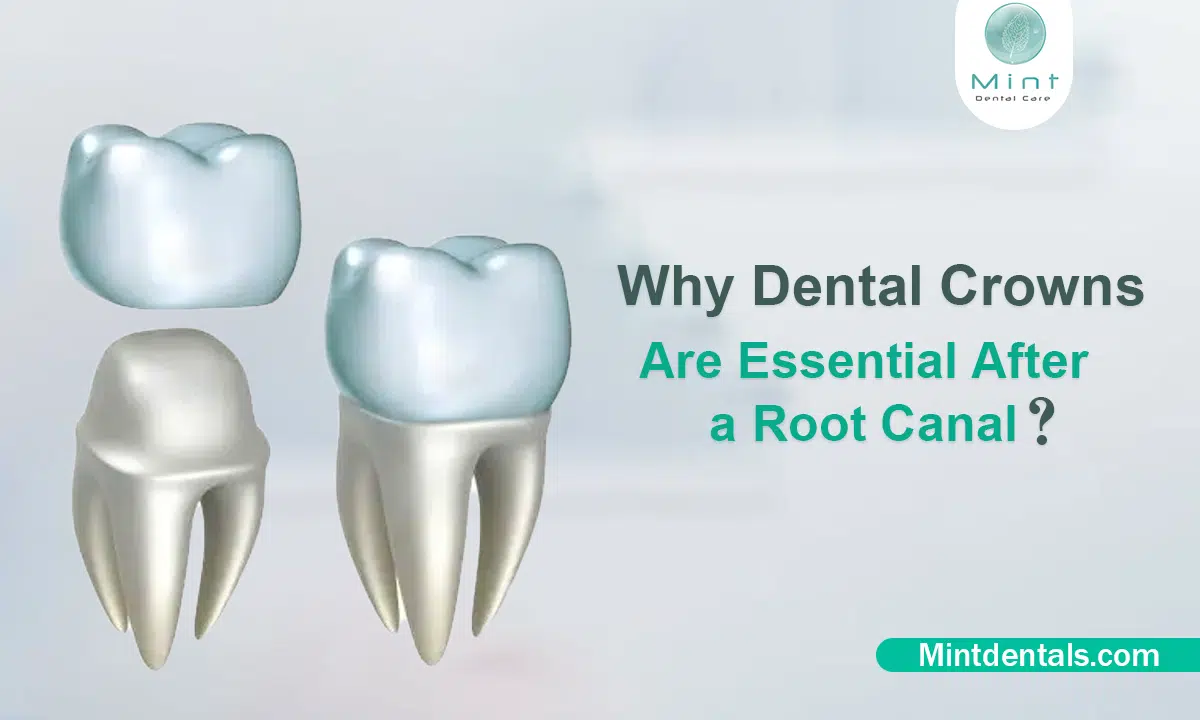A root canal is a valuable dental procedure that saves a severely infected or damaged tooth, preventing the need for extraction. However, after the procedure, the tooth is left fragile, and many dentists recommend a dental crown to restore its strength and appearance. This article explains why dental crowns are crucial following a root canal, especially in Dubai, where advanced dental services and cutting-edge technology are readily available. We will also explore the potential risks of skipping a crown and why consulting with a qualified dentist in Dubai is essential for long-term dental health.
Why Is a Dental Crown Necessary After a Root Canal?
After a root canal treatment, the structural integrity of the tooth is often weakened. The root canal process involves removing the infected pulp from inside the tooth, which contains blood vessels and nerves that help keep the tooth nourished. Once the pulp is removed, the tooth becomes hollow and significantly more susceptible to fractures.
A dental crown acts as a protective covering, encasing the visible part of the tooth. This “cap” restores the tooth’s shape, function, and strength, allowing it to withstand the forces of chewing and biting. In essence, the crown provides much-needed support, helping to preserve the treated tooth and prevent future complications.
What Happens if I Don’t Get a Crown After a Root Canal?
Skipping a dental crown after a root canal might seem tempting, especially if you want to avoid additional costs or appointments. However, leaving a root canal-treated tooth without a crown can lead to several potential complications that could result in more costly treatments in the future.
1. Weakened Tooth Structure
Without a crown, the treated tooth remains structurally weak and is more likely to fracture or break under pressure. This is especially true for molars and premolars, which endure the most chewing force. A fractured tooth may not only be painful but can also require extraction if the damage is severe.
2. Loss of Tooth Functionality
A weakened tooth may not function efficiently, leading to issues with your bite and chewing abilities. If the tooth cannot handle daily wear and tear, you may experience discomfort, which can affect your ability to enjoy your favorite foods.
3. Potential Tooth Loss
If a root canal-treated tooth fractures beyond repair, extraction may be the only solution. Losing a tooth not only impacts the appearance of your smile but can also lead to bone loss, shifting of surrounding teeth, and further oral health complications. Replacing an extracted tooth with an implant or bridge is often more costly and invasive than a crown.
What Are the Benefits of Getting a Crown After a Root Canal?
Opting for a dental crown following a root canal has numerous advantages that contribute to the long-term health and appearance of your smile. Here are some of the key benefits:
1. Prevention of Re-Infection
A crown effectively seals the treated tooth, preventing bacteria from re-entering and causing a new infection. This helps ensure the success of the root canal treatment, reducing the risk of complications and maintaining a healthy tooth.
2. Protection from Further Damage
The crown acts as a protective shield, absorbing the force exerted during chewing and safeguarding the weakened tooth from fractures or additional damage. Without a crown, the likelihood of cracks and breaks increases, potentially leading to painful and expensive corrective treatments.
3. Restoration of Tooth Functionality
A crown restores the treated tooth’s natural shape, size, and function. With a well-fitted crown, you can chew comfortably and speak without issues, as the crown integrates seamlessly with your natural bite and supports proper dental alignment.
4. Improved Aesthetic Appearance
Dental crowns are custom-made to match the color and shape of your natural teeth, providing a smooth, natural look. This enhancement is especially beneficial if the treated tooth is visible when you smile, as a crown will blend in seamlessly with your other teeth, giving you the confidence to smile freely.
Types of Dental Crowns Available in Dubai
In Dubai, dental clinics offer a variety of crown materials to suit different needs and preferences. Here’s a look at some of the most popular options:
1. Porcelain Crowns
Porcelain crowns are known for their natural appearance, making them an excellent choice for front teeth. They closely mimic the look of real teeth and are often preferred for their aesthetic value. However, they may not be as durable as other materials for molars that endure heavy chewing forces.
2. Ceramic Crowns
Ceramic crowns offer similar aesthetic qualities to porcelain but are more durable. They are also a popular choice for people with metal allergies, as they contain no metal components.
3. Metal Crowns
Metal crowns, usually made from gold or metal alloys, are highly durable and ideal for molars that require extra strength. Although metal crowns are not as visually appealing for front teeth, they provide a long-lasting solution for teeth that are less visible.
4. Porcelain-Fused-to-Metal Crowns (PFM)
PFM crowns offer the best of both worlds, combining the strength of metal with the natural appearance of porcelain. They are commonly used for both front and back teeth, providing durability along with a natural look.
Dental Crowns in Dubai: What Should You Consider?
With the wide range of dental crown options available in Dubai, choosing the right clinic and treatment plan can feel overwhelming. Here are some essential factors to consider:
1. Clinic Reputation and Experience
Selecting a well-reputed dental clinic with experienced dentists is key to achieving successful results. Look for clinics that specialize in restorative dentistry and have a history of positive patient outcomes. In Dubai, many clinics offer advanced technology and highly skilled professionals, so be sure to do thorough research and check online reviews.
2. Technology and Precision
Advanced technology, such as digital impressions and computer-aided design, ensures the highest level of precision when fabricating crowns. This technology not only improves the fit and appearance of the crown but also shortens the time needed for the procedure. Choose a clinic that utilizes state-of-the-art technology to ensure optimal results.
3. Cost and Quality Balance
While comparing costs is important, remember that the quality and expertise provided by the clinic should be prioritized. Opting for a low-cost option may result in subpar materials or craftsmanship, leading to additional repairs or replacements in the future.
Case Study: The Consequences of Skipping a Crown After Root Canal
Dr. Joffe, a reputable dentist, shared a case involving a patient who underwent a root canal but chose not to get a crown. The untreated tooth eventually cracked below the gum line, making it difficult to restore. As a result, the patient had to undergo an extraction and later opted for a dental implant to replace the lost tooth. This process was more invasive and costly than the initial crown would have been.
This case illustrates the importance of dental crowns after root canals, as they offer a protective measure that prevents similar complications. Investing in a crown initially can save time, money, and discomfort in the long run.
How Long Do Crowns Last?
With proper care, dental crowns can last many years. Factors such as the material used, the expertise of the dentist, and personal oral hygiene habits all contribute to a crown’s longevity. Porcelain and ceramic crowns can last 10–15 years, while metal crowns may last even longer.
To extend the lifespan of your crown, it’s essential to practice good oral hygiene, avoid hard or sticky foods, and schedule regular dental check-ups. Regular check-ups are particularly important, as they allow your dentist to monitor the condition of your crown and ensure that it remains securely in place.
Conclusion: Why Dental Crowns Are Essential After a Root Canal
Dental crowns are an essential part of post-root canal care, offering protection, functionality, and aesthetic value. After a root canal, the treated tooth is often left weak and vulnerable to fractures, making a crown crucial for preserving the tooth’s integrity. Crowns prevent re-infection, protect from future damage, and restore the natural appearance of your smile.
If you have recently undergone a root canal in Dubai, consulting with an experienced dentist about crown options is a wise investment in your long-term dental health. With a high-quality crown and regular dental care, you can enjoy a healthy, functional smile for years to come.
At Mint Dental Care in Dubai, our skilled team is dedicated to providing customized restorative solutions, including a range of dental crowns. Contact us today to book a consultation and find out which crown option is best suited for your needs after a root canal.















